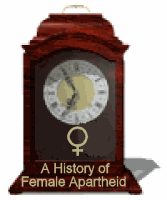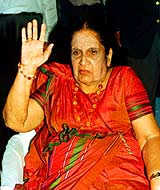
![]()
[Home] [Timeline] [Quiz] [Women Making History]

Women of History
SIRIMAVO BANDARANAIKE Born 1916
 Her
death, like her life, was linked to politics. Her departure, like her
arrival, was dramatic. In death, aged 84, Sirimavo Bandaranaike
suffered a massive heart attack on Tuesday on her way home from voting
in Sri Lanka's general election -- a poll that will determine whether
her daughter can pull off a constitutional makeover and end the
18-year-long civil war with the country's Tamil minority. In life, aged
44, this once shy housewife stepped into her assassinated husband's
shoes, becoming the world's first elected woman Prime Minister in 1960.
Over the years she turned a model state into a socialist poor house,
ruthlessly crushed a Marxist revolution and became the darling of the
once influential, but now irrelevant Non-Aligned Movement.
Her
death, like her life, was linked to politics. Her departure, like her
arrival, was dramatic. In death, aged 84, Sirimavo Bandaranaike
suffered a massive heart attack on Tuesday on her way home from voting
in Sri Lanka's general election -- a poll that will determine whether
her daughter can pull off a constitutional makeover and end the
18-year-long civil war with the country's Tamil minority. In life, aged
44, this once shy housewife stepped into her assassinated husband's
shoes, becoming the world's first elected woman Prime Minister in 1960.
Over the years she turned a model state into a socialist poor house,
ruthlessly crushed a Marxist revolution and became the darling of the
once influential, but now irrelevant Non-Aligned Movement.
Despite her formidable political skills and determination, Bandaranaike,
known to her fellow Sri Lankans as "Mrs B," never fully lost
her somewhat helpless, benign image as a favorite aunt. She could
skillfully use popular emotion to boost her support, frequently bursting
into tears as she pledged to continue her dead husband's policies. He,
Prime Minister Solomon Bandaranaike, was shot dead by a Buddhist monk in
1959. Her opponents and critics called her the "weeping
widow," yet here was a woman who had a firm political agenda.
More than anyone Bandaranaike put Sri Lanka on the world map, frequently earning the ire of the U.S. and its allies. And she created a political dynasty, although it has fallen apart now with its members squabbling over her legacy. Her second daughter, Chandrika Kumaratunga, is President of Sri Lanka and her only son Anura Bandaranaike is a key leader of the main political opposition, the United National Party. The two siblings mock each other mercilessly at public rallies, while their mother sat back and watched, sometimes shocked, sometimes enjoying it, her followers said.
A staunch socialist, Bandaranaike continued her husband's policies and nationalized key sectors of the economy such as banking and insurance. But she was on a roller-coaster ride from the moment she took office: Within a year of her 1960 election victory she declared a state of emergency. This followed a civil disobedience campaign by the country's minority Tamils, outraged by her decision to drop English as an official language and her order to conduct all government business in Sinhala, the language of the majority Sinhalese. This they considered a highly discriminatory act and an attempt to deny Tamils access to all official posts and the law. This support for Sinhalese chauvinism led directly to the Tamil insurgency which her daughter is now desperate to end.
Further problems arose with the President's state takeover of foreign businesses, which upset the Americans and the British, who imposed an aid embargo on Sri Lanka. As a result Bandaranaike moved her country closer to China and the Soviet Union and championed nonalignment. At home, she crushed an attempted military coup in 1963, and one year later, she was defeated on a confidence vote, losing the general election that followed. But she bounced back six years later with a big majority in the 1970 elections.
Her second term saw a new Constitution introduced, which broke all links with Britain. Ceylon was renamed Sri Lanka and declared a republic. But after just 16 months in power, a left-wing youth uprising almost toppled her government: Sri Lanka's small ceremonial army could not deal with the insurgency. But she was saved by her skillful foreign policy: The country's non-aligned friends rushed to her help. In a rare move, both India and Pakistan sent troops to Colombo and she crushed the insurgency. In those tough political years, Bandaranaike turned herself into a formidable leader. "She was the only man in her cabinet", one of her officials commented during the height of the insurgency.
The 1973 oil crisis had a traumatic effect on the Sri Lankan economy; the government had no access to Western aid and her socialist policies stifled economic activity. Rationing had to be imposed. Bandaranaike became more and more intolerant of criticism and forced the shutdown of the Independent newspaper group, whose publications were her fiercest critics. Earlier she had nationalized the country's largest newspaper, Lake House, which has remained the government's official mouthpiece.
By 1976, Bandaranaike was more respected abroad than at home. Her great triumph that year was to become chairman of the Non-Aligned Movement and host the largest ever heads of state conference the country had ever seen. But despite her high standing internationally, she was losing support rapidly amid allegations of corruption, and against a background of an economy that was rapidly going downhill. Nothing it seemed could save her. She suffered a crushing election defeat in 1977 and was stripped of her civic rights. The 1980s were her dark days -- a political outcast rejected by the people who had once worshipped her. She spent the next 17 years in opposition wading off challengers to her leadership of the Freedom Party, even from her own children. Always the politician, she played her ambitious daughter Chandrika and son Anura against each other, holding on to control despite losing every subsequent general election. But she met her match in Chandrika who outmaneuvered her mother to become President of Sri Lanka in 1994, when a Freedom Party-led coalition won power in the general elections.
By then, ailing from a stroke, her daughter appointed her to the mainly figurehead position of Prime Minister. Six years later, in August this year, she resigned to make room for a new parliamentary leader to fight this week's election campaign. It was said she left reluctantly. Given her passion for politics, it was probably true. (From her Obituary in The Times October 2000)